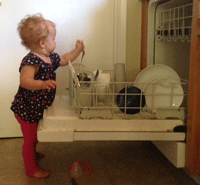 “Did you hear that?” my daughter-in-law and I queried one another. It sounds like she is saying “Thank you.” Such are the fantasies of a mommy and gramma of a newly-one-year-old. But hey! It might actually be true. Maybe my one-year-old granddaughter’s first words were “thank you,” translated something like “da do.” That would be pretty cool, considering that gratitude is the moral quality we hope to awaken in the young child.
“Did you hear that?” my daughter-in-law and I queried one another. It sounds like she is saying “Thank you.” Such are the fantasies of a mommy and gramma of a newly-one-year-old. But hey! It might actually be true. Maybe my one-year-old granddaughter’s first words were “thank you,” translated something like “da do.” That would be pretty cool, considering that gratitude is the moral quality we hope to awaken in the young child.
And how do we do that? By dunking them daily into a pool of delightful life—rhythmical, simple, artful, practical, levity-lifted life. These fresh-from-heaven folk come to us with their own bucket list for their three stages of childhood. According to the tenants of Waldorf education, when they are little, they unconsciously expect a life filled with goodness. When they are in middle childhood, they hope to explore the beauty in the world. And when they are in their youthful budding-adult years, they require us to represent what is true, offering thoughtful conversation and life activities that will awaken their commitment to care for the world.
Are we not blessed, dear friends, to be in the business of tending to the soil and substance of life that, along with regular watering and feeding, yields marvelous miracles called human beings! Further blessing is that, especially when they are just little seedlings, it is life itself that provides the tools of learning. The challenge can be to remember that fact, particularly in the midst of a world filled with gadgetry, gimmick and gobbledygook trying to convince us otherwise.
For the last three months I have been attending an advanced seminar in Sacramento. It is a “private school,” and you can only attend by invitation. So you can imagine my surprise and delight when I was offered the opportunity. It is the School of Eloise and her Parents, and the invitation was extended to me, Eloise’s grandmother, to live in their home while mommy went back to teaching part-time at the local university. I was not only offered room and board, but was given free reign of the campus, comprised of several rooms used for daily living, called a home!
While I have learned enough to write a dissertation, one prevalent behavior of Eloise’s parents has especially captured my attention. Almost every time Eloise offers her services, her parents say, “Thank you, Eloise.” Mind you, the unschooled observer might not recognize what Eloise is doing as being of particular service. For example, when loading the dishwasher, she has a tendency to take as many of the spoons out of the tray as she puts in, but she is earnest in her endeavor. When she folds laundry, her favorite part is shaking the cloth and throwing it on the floor, but she is consistent. She is excellent at arranging and re-arranging the diaper drawer (and other drawers, for that matter). She just started walking this week, so I think we can anticipate many more domestic contributions to come!
What stirs my heart is that in a culture that has a tendency toward pushing away or distracting the little hands and feet that get in the way of accomplishing our chores, I have been living in a household of “thank you.” I have also been seeing the advent of skill-building. More spoons are going in the tray now (at least occasionally). An attempt at corner-to-corner is showing up in folding the laundry. But maybe the most profound skill is that Eloise is learning the language of gratitude. And this gramma is very grateful to have been steeped in such love and grace in this high school of learning called life.
Thank you, dear parents. Da do, dear Eloise.
